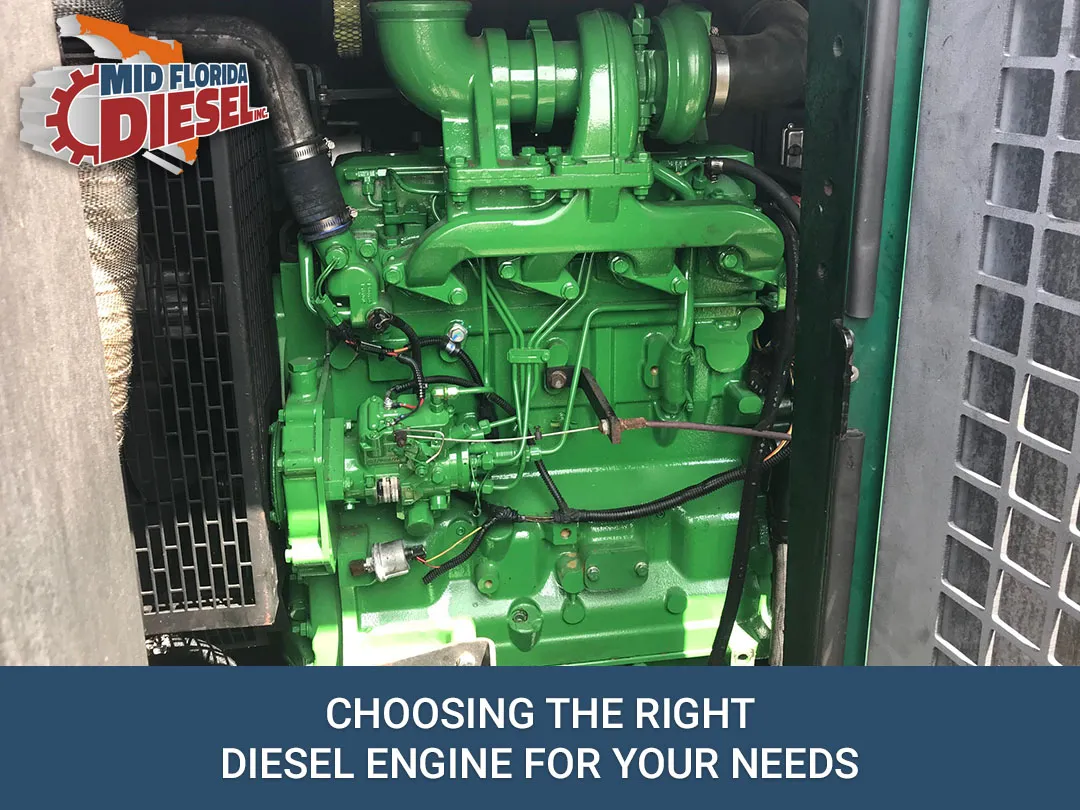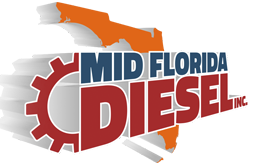 Selecting the right diesel engine for your specific needs is a critical decision that can affect performance, efficiency, and longevity, especially in the Mid-Florida region, where diverse applications from marine to industrial and automotive are prevalent. Understanding what to look for will ensure you make an informed choice tailored to the unique demands of Mid Florida’s varied environments and industries.
Selecting the right diesel engine for your specific needs is a critical decision that can affect performance, efficiency, and longevity, especially in the Mid-Florida region, where diverse applications from marine to industrial and automotive are prevalent. Understanding what to look for will ensure you make an informed choice tailored to the unique demands of Mid Florida’s varied environments and industries.
Understand Your Requirements
The first step in selecting a diesel engine is to clearly understand your requirements. Different applications demand varying power outputs, sizes, and fuel efficiencies. For instance, a marine engine prioritizes reliability and power in a compact form to withstand harsh sea conditions. In contrast, industrial engines may require higher power outputs for heavy-duty operations, and automotive engines focus on fuel efficiency and emissions.
Power and Torque
The power output and torque are crucial factors. Power, measured in horsepower (HP) or kilowatts (kW), indicates the engine’s capability to perform work. Torque, on the other hand, measures the force the engine can produce to turn a shaft or propeller, which is crucial for starting loads or hauling heavy materials. Higher horsepower is essential for speed, while torque is key for towing and carrying heavy loads. Match the engine’s power and torque specifications to your application’s demands.
Fuel Efficiency
Diesel engines are renowned for their fuel efficiency, which is a significant consideration for operational costs over time. Fuel efficiency is particularly critical in applications like long-haul transportation or continuous industrial operations, where fuel costs can accumulate. Evaluate the engine’s fuel consumption under typical operating conditions to estimate ongoing costs.
Emissions and Environmental Regulations
Environmental considerations are increasingly important in choosing a diesel engine. Many regions have strict emissions regulations to mitigate environmental impact. Look for engines that comply with current emissions standards in your area, such as the U.S. Environmental Protection Agency (EPA) or the European Union’s Euro standards. Advanced diesel engines are equipped with technology like selective catalytic reduction (SCR) and exhaust gas recirculation (EGR) to reduce harmful emissions.
Durability and Reliability
The durability and reliability of an engine are paramount, especially for applications that demand continuous or rugged use. High-quality engines designed with robust materials and built to withstand harsh operating conditions will offer longer service life and reduced downtime. Check the engine’s design and construction features, and consider manufacturers with a strong reputation for reliability.
Maintenance and Support
Consider the maintenance requirements and availability of support you’re interested in. Regular maintenance is crucial for optimal performance and longevity. Look for engines with accessible parts and straightforward servicing needs. Additionally, ensure there’s a reliable network of service centers or technicians who can provide support when needed.
Size and Weight
The physical size and weight might be critical factors depending on the application. In marine and automotive contexts, where space is often at a premium, compact engines that don’t sacrifice power are valuable. Industrial applications might have more flexibility in size, but consider the engine’s footprint in the available space.
Cost
While the initial purchase price is an important consideration, it’s also essential to consider the total cost of ownership, which includes maintenance, fuel consumption, and potential downtime. Sometimes, investing in a more expensive engine upfront can save money in the long run due to lower operational costs and higher reliability.
Technological Advancements
Stay informed about technological advancements in diesel engine design and features. Innovations such as turbocharging, advanced fuel injection systems, and electronic controls can offer significant benefits in terms of performance, efficiency, and emissions control. Choosing an engine that incorporates these advancements can provide a competitive edge and future-proof your investment.
Selecting the Right Manufacturer
Finally, choosing the right manufacturer is as important as selecting the engine itself. Look for companies with a strong history in diesel engine production, offering comprehensive warranties and customer support. Manufacturers who invest in research and development to improve their engines are often the ones leading the market in reliability and efficiency.
Choosing the right engine involves a meticulous evaluation of your specific requirements, including power, fuel efficiency, emissions standards, and overall reliability. By considering these key factors, you can ensure that the diesel engine you select will deliver optimal performance and durability for your application, whether it’s marine, industrial, or automotive.
For those embarking on this crucial decision-making process, seeking expert advice can be incredibly beneficial. Remember, the investment in a diesel engine goes beyond the initial purchase. It’s about securing efficient, reliable performance that aligns with your operational demands. By leveraging expert resources like Mid Florida Diesel and conducting thorough research, you can make an informed decision that ensures your investment is sound, sustainable, and suited to the unique challenges of your application in Mid Florida and beyond.
Picture Source: Mid Florida Diesel





